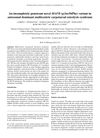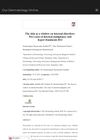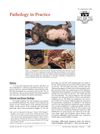 March 2010 in “Ejc Supplements”
March 2010 in “Ejc Supplements” ROR-alpha may increase the growth of certain breast cancer cells by boosting aromatase, which could affect breast cancer prognosis.
 September 2019 in “Journal of Investigative Dermatology”
September 2019 in “Journal of Investigative Dermatology” Sandalore® reduces hair shedding and increases hair volume in women with telogen effluvium.
 15 citations,
October 2014 in “Journal of Investigative Dermatology”
15 citations,
October 2014 in “Journal of Investigative Dermatology” New treatments targeting the Hedgehog pathway can help treat advanced skin cancer but may have side effects and their effectiveness in early stages is unknown.
16 citations,
March 2021 in “EvoDevo” Different species use the same genes for tooth regeneration.
 15 citations,
July 2021 in “Bosnian Journal of Basic Medical Sciences”
15 citations,
July 2021 in “Bosnian Journal of Basic Medical Sciences” Stem cell therapy is promising for treating various health conditions, but more research is needed to understand its full potential and address challenges.
 1 citations,
October 2023 in “Egyptian Journal of Immunology”
1 citations,
October 2023 in “Egyptian Journal of Immunology” PCOS is linked to low-grade chronic inflammation.
 40 citations,
March 2019 in “Nature Communications”
40 citations,
March 2019 in “Nature Communications” CRAC channels are crucial for the development and function of specialized immune cells, preventing severe inflammation and autoimmune diseases.
 December 2024 in “Journal of Education Health and Sport”
December 2024 in “Journal of Education Health and Sport” Too much sugar harms skin, causing wrinkles and acne, but a low-sugar diet can help.
 29 citations,
December 2016 in “The EMBO Journal”
29 citations,
December 2016 in “The EMBO Journal” Gata6 is important for protecting hair growth cells from DNA damage and keeping normal hair growth.
 14 citations,
June 2017 in “Immunity”
14 citations,
June 2017 in “Immunity” Special immune cells called Treg cells are important for maintaining and regenerating hair by activating a specific growth signal in hair stem cells.
 82 citations,
February 2017 in “Cold Spring Harbor Perspectives in Biology”
82 citations,
February 2017 in “Cold Spring Harbor Perspectives in Biology” The TGF-β family helps control how cells change and move, affecting skin, hair, and organ development.
 20 citations,
May 2013 in “International Journal of Molecular Medicine”
20 citations,
May 2013 in “International Journal of Molecular Medicine” Researchers found a new gene variant linked to a rare bone disease, which doesn't always cause symptoms in carriers.
 September 2012 in “The Egyptian Journal of Histology”
September 2012 in “The Egyptian Journal of Histology” Flutamide caused damage to male rat reproductive organs and may affect fertility.
 13 citations,
October 2021 in “Anais Brasileiros de Dermatologia”
13 citations,
October 2021 in “Anais Brasileiros de Dermatologia” Dermoscopy is effective for diagnosing various skin infestations and infections.
 11 citations,
September 2021 in “Anais Brasileiros de Dermatologia”
11 citations,
September 2021 in “Anais Brasileiros de Dermatologia” The conclusion is that early diagnosis of skin signs linked to diseases like Lupus, Dermatomyositis, and Rheumatoid Arthritis is crucial to prevent serious complications.
 5 citations,
September 2009 in “Journal of Complementary and Integrative Medicine”
5 citations,
September 2009 in “Journal of Complementary and Integrative Medicine” Citrullus colocynthis fruit extract and its compound may help treat enlarged prostate.
 October 2020 in “Our Dermatology Online”
October 2020 in “Our Dermatology Online” Skin changes and high vitamin B12 levels can be early signs of cancer.
 September 2019 in “Journal of Investigative Dermatology”
September 2019 in “Journal of Investigative Dermatology” Sandalore®, a synthetic scent, reduced hair loss and improved hair growth in women with telogen effluvium.
 September 2019 in “Journal of Investigative Dermatology”
September 2019 in “Journal of Investigative Dermatology” Retinol significantly reduces neck wrinkles.
 4 citations,
May 2014 in “Javma-journal of The American Veterinary Medical Association”
4 citations,
May 2014 in “Javma-journal of The American Veterinary Medical Association” The cat had liver cancer and a related hair loss condition, with a likely cause being bile duct cancer.
 2 citations,
January 2014 in “Elsevier eBooks”
2 citations,
January 2014 in “Elsevier eBooks” The document concludes that reactivation of herpesviruses, especially HHV-6, is linked to severe symptoms and complications in drug-induced hypersensitivity syndrome.
 234 citations,
April 2000 in “Gene”
234 citations,
April 2000 in “Gene” Msx and Dlx genes are crucial for development, controlling cell behaviors like growth and differentiation through their roles as gene regulators.
 April 2012 in “The Journal of Urology”
April 2012 in “The Journal of Urology” More prostate biopsies increase the chance of finding cancers that may not need treatment.
 April 2022 in “Reproductive health of woman”
April 2022 in “Reproductive health of woman” New methods for identifying and managing polycystic ovary syndrome in teenagers are improving.
 February 2023 in “Journal of Advanced Research”
February 2023 in “Journal of Advanced Research” A new method using Platelet-rich Plasma (PRP) in a microneedle can promote hair regrowth more efficiently and is painless, minimally invasive, and affordable.
48 citations,
August 1998 in “Developmental Biology” Deleting part of a gene in mice causes wavy hair and high pup loss.
 1 citations,
July 2019 in “British Journal of Dermatology”
1 citations,
July 2019 in “British Journal of Dermatology” Minoxidil was more effective than laser therapy for hair loss, and the report also highlighted the need for more research on PRP for a different hair loss condition, the impact of social media on alopecia views, and a warning on turmeric causing nail discoloration.
 August 2023 in “JOJ dermatology & cosmetics”
August 2023 in “JOJ dermatology & cosmetics” Antibiotics often cause skin reactions, making them a major health concern.
 10 citations,
August 2002 in “Sexualities”
10 citations,
August 2002 in “Sexualities” The critique suggests that Wilton's work unintentionally supports the very stereotypes it aims to question and calls for a broader, more inclusive approach to understanding gender.
 8 citations,
April 2015 in “Expert Review of Gastroenterology & Hepatology”
8 citations,
April 2015 in “Expert Review of Gastroenterology & Hepatology” Effective symptom management in IBD improves quality of life and prevents complications.




























